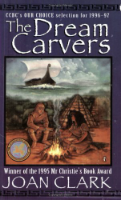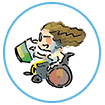 Summary: While on an expedition for lumber with his father, Thrand is taken by the Osweet tribe as a replacement for a tribe member he helped kill. Renamed Wobee and encouraged to take his place in the tribe, Thrand eventually does his best to fit in while still looking for an opportunity to find his way back from Leifsbudir (Newfoundland) across the sea to his family in Greenland. As time passes, Thrand must decide how far he is willing to go to get back to the life he once knew, or if he can embrace the life the Osweet tribe has offered him.
Summary: While on an expedition for lumber with his father, Thrand is taken by the Osweet tribe as a replacement for a tribe member he helped kill. Renamed Wobee and encouraged to take his place in the tribe, Thrand eventually does his best to fit in while still looking for an opportunity to find his way back from Leifsbudir (Newfoundland) across the sea to his family in Greenland. As time passes, Thrand must decide how far he is willing to go to get back to the life he once knew, or if he can embrace the life the Osweet tribe has offered him.
Number of Pages: 226
Age Range: 16-18
Review: At what we nowadays might consider the tender age of fourteen, Thrand/Wobee is already a man in Joan Clark’s The Dream Carvers. Set in the early 1000s when childhood and a person’s general lifespan were significantly shorter, young Thrand/Wobee handles his separation from his father with a generally peaceful maturity, even while trying his best to get back to his family.
I’ve skimmed reviews of this book, and keep encountering it being described as a ‘coming-of-age’ story. This is an accurate description. Clark gently explores Thrand’s transformation from the Norse life he has known to his new identity as Wobee, member of the Osweet tribe. For a fourteen year-old, Thrand/Wobee shows remarkable self-awareness, and I enjoyed reading his perspective on a situation that was both influenced by his actions and out of his control. Gradually he comes to accept and embrace his new life once he realises he must give up the pursuit of his old life.
My one complaint is that the perspective changes between Thrand/Wobee and Abidith were abrupt and confusing at times with little transition between the two. On page 95, the narrative even seems to switch perspectives from Abidith to Thrand/Wobee mid-paragraph. Otherwise, I loved Clark’s richly detailed glimpse into the land of Canada a thousand years before our time.
This is a slow-moving book, but worth it if you are patient and give it your full attention. Clark aptly chronicles the connections between the native people and the land contrasting the different traditions and beliefs of the Osweets and the Norse people in an intriguing way. I would recommend it to older teen readers because of its contemplative nature.
Memorable Quotes:
“The gods, three sisters, Being, Necessity and Fate, sit at their loom beneath the Tree, weaving the lives of ordinary people. So my mother says. Whether you are on the good side or the bad side of the gods depends on Chance. If the sisters weave you an unlucky life, there’s little you can do to change your fate. Not even Thor can help you out.” – Thrand from The Dream Carvers by Joan Clark, pages 23-24
“After we have finished eating, the tale-telling begins. Grandfather says that the tale-telling is part of the feast, that we are as hungry for stories as we are for meat. He says we need such food if we are to keep our heads alive. It’s possible, he says, to starve the head, for the head eats stories, instead of meat. If the head goes without eating, Grandfather says, it too will shrivel and die.” – Abidith from The Dream Carvers by Joan Clark, page 78
“Just as I am learning to carve something useful with wood, so I am learning to make something from my thoughts that will better explain the truth. To do this I must learn how to see the difference between what I am now to what I once was.” – Thrand from The Dream Carvers by Joan Clark, page 114
“I have been depending too much on chance, willing myself to change circumstances far beyond my power. It is hard for me to accept what I cannot change for I am someone who must prove everything for himself.” – Thrand from The Dream Carvers by Joan Clark, page 210
The Dream Carvers by Joan Clark is published by Penguin Books Canada (1997).
(Buy this book: Amazon | Indigo | Canadian Booksellers)




 Amy Mathers has been passionate about reading from a very young age, and hopes others will share her enthusiasm for funding a teen book award.
Amy Mathers has been passionate about reading from a very young age, and hopes others will share her enthusiasm for funding a teen book award. 





